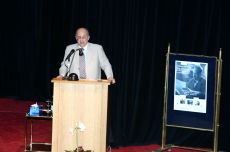Honoring Dag Hammarskjöld’s legacy
Posted on
Alexandria, 28 April 2005—On the occasion of the centenary of Dag Hammarskjöld (1905-1961), Secretary-General of the United Nations, 1953-1961, the Bibliotheca Alexandrina organized a celebration to honor the renowned international figure on 28 April 2005, in collaboration with the Swedish Institute in Alexandria. Speakers included Dr. Ismail Serageldin, Director, Bibliotheca Alexandrina; Ambassador Stig Elvemar, Swedish Ambassador in Cairo; Mr. Jan Henningsson, Director, Swedish Institute in Alexandria; and Ambassador Sayed Amin Shalabi, Executive Director, Egyptian Council for Foreign Affairs.
Dr. Serageldin inaugurated the celebration with his speech, “Paths to Community—or parting of the ways”, that shed light on Dag Hammarskjöld, and his greatest legacy to the world—his role at the United Nations (UN). He spoke of how Hammarskjöld left his imprint on his post, the UN and international affairs and how he gave new meaning to the concept of international diplomacy, law and civil service. An ideal man who believed that goodwill among men and nations would one day create conditions in which peace would prevail in the world, Hammarskjöld died in the quest for peace. He was awarded the Nobel Peace Prize for 1961 posthumously in gratitude for all he did, for what he achieved, for what he fought for: to create peace and goodwill among nations and men.
Ambassador Elvemar then spoke of "Celebrating Dag Hammarskjöld and honoring his legacy", and of the traveling exhibition of Dag Hammarskjöld and other activities organized to honor the eminent diplomat. He indicated how his book, Markings, was a remarkable record of his spiritual life, and added that Dag Hammarskjöld felt the UN was not to be used as an instrument by the great powers only, but was for all countries. This engendered great respect for him throughout the world.
Ambassador Shalabi then proceeded with his speech entitled “The Power of Persuasion; Diplomacy and the International Community—Hammarskjöld’s Legacy—Nostalgia for a lost era or lessons for future implementation?”. Ambassador Shalabi is author of Dag Hammarskjöld—hayatuhu wa fikruhu (“Dag Hammarskjöld—his life and thought”), the first major study of Hammarskjöld in Arabic. He spoke of how Dag Hammarskjöld was “not only a diplomat but a thinker”, and pointed out that his ideals, values and principles are still very much needed these days.
The exhibition, inaugurated on 28 April and held up to 5 May, is a traveling exhibition produced by the Dag Hammarskjöld Foundation in close collaboration with the Ministry for Foreign Affairs and the Swedish Institute. Its purpose is to draw attention to Hammarskjöld’s achievements as the UN Secretary-General and to spread knowledge about the UN.
Hammarskjöld, one of the most admired and respected international figures of the 20th Century, carried out many responsibilities for the United Nations in the course of its efforts to prevent war and serve the other aims of the Charter.
Click here for Dag Hammarskjöld’s
biography and web resources about him.
 |
 |
| The Opening Session speakers |
Dr. Ismail Serageldin
during his speech |